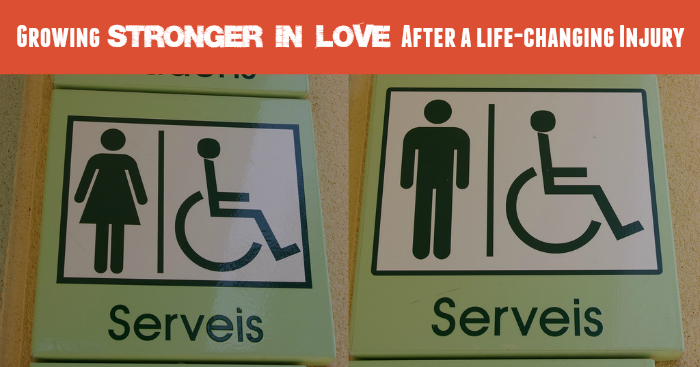[callout]This is a guest post from Marco Bendinelli. Marco is an attorney in the state of Colorado. He’s shared a post on a topic that I haven’t covered on my blog before — what happens when one spouse suffers a life-changing injury, and how to make your marriage stronger through it. Whether you’ve experienced this or not, what he shares can benefit your marriage. If you want to guest post on my blog, check out my guest post guidelines and submit your post.[/callout]
Few things can shake up your personal life more than a major injury. When you suddenly become disabled or otherwise injured, many things can crash as a result; not least of all is your love and marriage. How do you remain strong as a couple while coming to terms with such devastating life changes?
When your personal body changes, it is easy to focus inwards and accidentally shun those you love. It is during these times especially that you should strive to work together as a couple. Indeed, couples that make the effort during the most difficult times often emerge with some of the strongest marriages you will likely see.
The Personal Connection
No matter what happens to your physical body, you are still you. Your loved one should still see you for who you are, in terms of personality, charisma and emotional connection, even if you do not. Because of this, spending time together and keeping that bond alive is crucial. There are many ways to do this. Let’s look at some classic date
activities:
- A Restaurant
- The Cinema
- A Romantic Dinner at home
- Feeling adventurous? Why not take a weekend away.
These can be easily done regardless of most injuries. What’s important is that couples take the time to go out together, growing as a pair. This is also about doing the things you used to do. There will still be many
things that are possible, so isn’t it better to focus on the positives rather than the negatives?
Other Shared Activities
When many people experience a life-changing injury, they are often encouraged to take up new activities in relation to their injury. These often include:
- Sports (such as those in the Paralympics)
- Less-active hobbies, such as arts and crafts
- Cooking
- Writing
This is great for the individual, but it often sets up a barrier in relationships. Spend too much time doing this and you’re spending too much time away from your loved one.
Instead, or at least alongside, these activities, you should find things that can include your significant other. Play in a new sport? Invite your partner to the games, introduce them to the team and let them be involved
with this new part of you.
This helps to grow a bond between you as a couple, while also readily accepting your injuries. Without this, it’s possible to end up leading two lives – one where you deal with your disability and one where you spend time with your partner – rather than one, completely.
Accepting Limitations
One of the easiest ways to cause a divide is by not talking. With physical changes to the body, many will often want to not talk about it, or see any sort of help as patronizing. While understandable, this isn’t something you should do to someone you care about.
Try letting them in and helping where they can. Communication and honesty will help identify any problems (from either person), solving them before they become an issue. When you can’t do something, or need a little help,
just ask. Your partner will appreciate being the one you come to with private or delicate matters.
Social Life
Many couples can often underestimate the importance of a social life. Being able to enjoy your own company as well as others around you is a sure sign of a strong marriage. Yet, being injured or disabled can often cause people to worry. Similarly, support groups are useful but they should not replace your social life.
Talking to others allows you to let off steam while still being with those you care about. If you spend all the time indoors with each other, tensions can often get pretty high. Remember this at all times and, if you haven’t socialized in a while, isn’t it time you went out?
A Need for Empathy
Finally, this last point is just as important for either person in a marriage. Empathy is always crucial; the need to understand someone else on an emotional level is a key part of love. If your partner has been seriously injured, don’t rush their recovery. Healing often takes time, both emotionally and physically, so you should be there to support them.
On a similar note, you should understand and appreciate the level of support your partner is able to show you. If your partner has to adapt to providing care, they may get stressed or exhausted as a result. In these cases, you should recognize that they are trying.
In the end, they say love conquers all. This is most certainly true, but it doesn’t happen by chance. With a little work and commitment, couples can often come out of the darkest periods being stronger and closer than
ever.
[reminder]What are some other ways a couple can grow stronger after suffering a life-changing injury?[/reminder]
photo credit: Hay que reorganizar los cuidados via photopin (license)

